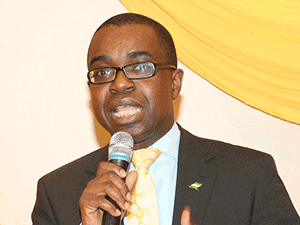•NCC disagrees, says Nigeria can’t be an exception
Telecommunication service providers have flown another kite that excessive rainfall is one of the factors responsible for poor quality of service (QoS) across the country, a claim the Nigerian Communications Commission (NCC) disputes.
Mr. Akinwale-Goodluck, Corporate Services Executive MTN Nigeria
MTN Nigeria Corporate Services Executive, Wale Goodluck, also an executive of the Association of Licensed Telecommunications Operators of Nigeria (ALTON), made the claim in Lagos at the Telecoms Consumer Parliament organised by the NCC.
Subscribers in Lagos and Abuja have experienced drop calls in recent weeks, questioning the capacity of the NCC to regulate the industry to measure up to counterparts elsewhere.
But Goodluck insisted that no network sets out to provide poor QoS and that most service disruptions are caused by problems beyond the control of service providers.
He urged Abuja and the NCC to hasten the passage of the bill in the National Assembly (NASS) which designates telecommunications facilities as critical national infrastructure.
Goodluck lamented that state governments, in a bid to collect rent and taxes, seal off the base transceiver stations (BTS) of service providers, which does not augur well for the industry and the nation.
As long as these situations are not addressed subscribers will continue to complain of poor service, he warned.
Plateau State Internal Revenue Service recently sealed off the North East office of MTN in Jos.
The head of the enforcement team, Godwin Jiwul, explained that the action was taken because of the refusal of MTN to pay N15.91 million tax which has piled up since 2005.
As regards unsolicited text messages, Goodluck explained that a lot of them are from outside the African continent as the service is a big business across the world, with data sold to various entities.
He said because people realise that Nigeria’s bulk SMS providers have strict rules, they buy in bulk on the internet from other service providers and send them to Nigerian subscribers masking their numbers.
He described it as guerrilla SMS marketing and stressed the need to get filtering devices to monitor unsolicited messages.
NCC Executive Vice Chairman, Eugene Juwah, added at the forum that subscribers are not getting value for money, which makes it necessary to find solutions to poor QoS
According to him, the NCC will ensure that consumers are protected from vices such as exploitation, extortion, unfair practices, unsolicited text messages, telemarketing, unwarranted billing, drop calls and inability to access service provider’s help lines.
He disagreed with the explanation that excessive rainfall impacts negatively on QoS, saying Nigeria cannot be an exception in the global telecommunication space.
Consumer Affairs Bureau Director, Mariam Bayi, said the Telecoms Consumers Parliament is being refocused for greater efficiency.
She reeled out a long list of challenges that consumers face daily and called on service providers to find solutions.
She confirmed that complaints have reached the bureau about unlawful deductions from subscribers’ account for value added services (VAS) not subscribed to and from which they cannot opt out.
Bayi implored telecom operators to realise that they are in business because of consumers and so must take the interest of the consumers seriously.











